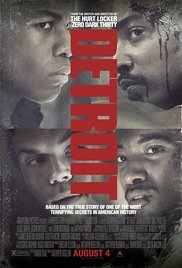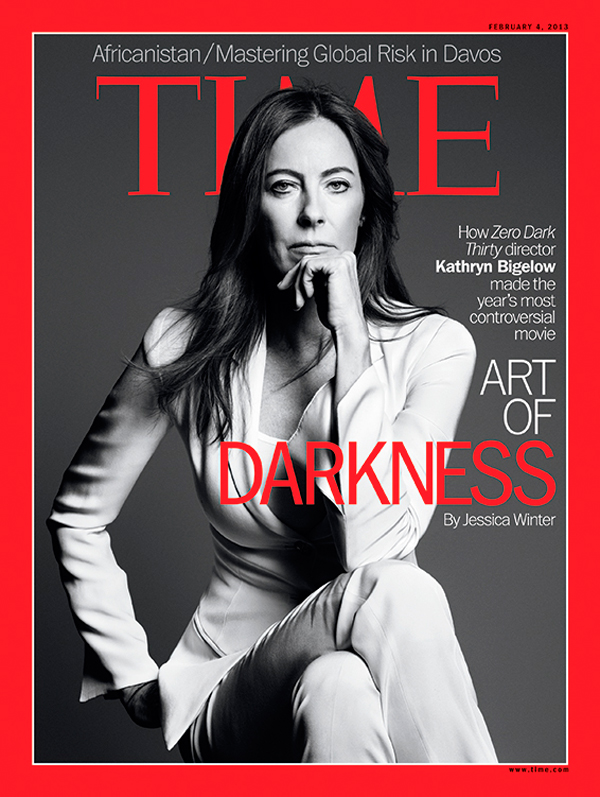‘It’s a War Zone Out There…’
Detroit
(2017)

I think that we can safely call Kathryn Bigelow a talented painter, producer and even occasional actress. And we can certainly call her an always interesting and quite brilliant film director. What we can’t call her is a prolific one.
To my astonishment and mumbles of ‘where did the years go’? I’ve just discovered that it is a full three decades since she nailed me to the cinema seat with the stunning western/action/ vampire classic Near Dark… and Detroit is only her ninth feature film since then.
I’ve followed her through her action film phase with Blue Steel and the sublime Point Break (and how could I not love a beautiful woman who cited the work of Sam Peckinpah as a major influence?); her foray into science fiction with the underappreciated and disturbing Strange Days; drama with The Weight of Water; and her thrilling tale of submarine tensions and box-office failure, K-19: The Widowmaker.
The film at hand is her third consecutive outing in the company of sometime journalist Mark Boal who also wrote the screenplays for her mainstream breakthrough and Oscar-winning The Hurt Locker and the excellent Zero Dark Thirty [reviewed here].

© Time Magazine
So: on every level I’m a fan. Finally, I thought, I’m going to see a film dealing with that thorny subject of race relations I can really get my teeth into – and my God, what a time in American history this was coincidentally released at!
And what a disappointment. Don’t get me wrong, this is a very good film. But at nearly two-and-a-half hours it actually feels it (something the longer Zero Dark Thirty didn’t) and could indeed have benefited from losing at least twenty minutes.
The story takes place to the background of the Detroit Riots in the summer of 1967; and there’s wasn’t much Love going on here, that’s for sure. Bigelow successfully mixes in real-life footage and stills with an almost documentary feel in the dialogue and it’s something that she now seems to be at home with. She allows us to leisurely watch the mayhem develop, with the black community predictably destroying their own neighbourhood; and she also introduces us to some of the main characters such as black security guard Melvin Dismukes (John Boyega) and white cop and 100% murderous mental case Philip Krauss (Will Poulter).
One of the interesting things that Boal and Bigelow does is to show the various, often confusing, dynamics at work here; and, crucially, they do so without making the audience feel that they are ramming a history lesson down our throats. Black security guards are hired to protect black shops against black looters; white National Guardsmen and even many of the police force find themselves disgusted by how some of their own members behave.
And at times it seems as if the Vietnam War has simply relocated to the streets of Motor City.
Director and writer then gradually narrow the action down to one terrible event. Larry Reed (Algee Smith) has to abandon a show that is crucial to his r&b band The Dramatics as the riots threaten to spill into the theatre; and he and his friend Fred Temple (Jacob Latimore) check into the Algiers Motel where they get into the company of two white girls who are holidaying from Ohio, Julie Ann (Hannah Murray) and Karyn (Kaitlyn Dever). They also meet up with another group of black motel guests that Julie and Karyn have befriended. They’re a likeable bunch but one of them makes the dreadfully stupid error of firing a starter pistol into the National Guardsmen and cops who are in the streets and already have their nerves on a knife-edge.
So many of what leads up to the killings at the Algiers are, as shown here, down to ridiculous lapses in judgment, most of which seem to be based in reality. Firing the pistol as a prank (‘Now everyone feels like a Negro’) is bad enough; but earlier we have seen Philip Krauss’s superior officer send him back onto the streets after telling him that he intends to recommend that he be indicted for attempted murder!
After a brief siege of the motel it is Krauss and his three thuggish buddies who are left in charge and there then follows a brutal and protracted ‘interrogation’ that could more simply be called ‘torture’ – at least some of which is caused by sexual jealousy in the cops at finding two white girls in a room with black men.
And here I think that Bigelow makes an enormous mistake. Yes, the torture is suspenseful, dark and awful; and it often leaves the viewer with heart in mouth. But it seems to me that it makes its point.
And then makes its point again.
And again.
Until the whole effect is almost diluted. Finally, we’re left exhausted…and we haven’t even come to the trial and the aftermath yet.
I’m not quite sure why Detroit doesn’t work for me better than it does. There is certainly no getting away from the fact that it is superbly made and does in fact seem to have stayed reasonably close to the facts. Of course, certain things have had to be changed simply because some of the principles are still alive; but Boal has done a fine job all the same.
Perhaps it’s just that by showing us so much of the rioting as well as the endless torture sequence that there seems a lack of focus. There’s also that nagging feeling that the principles are just too aware that what they are making is…worthy. It is; yet Bigelow and Boal hedge their bets a bit by giving us a card at the end that says dramatic license has been taken as there was no definitive account of what took place at the Motel Algiers fifty years ago.
The film is obviously intended to have relevance for a modern audience; and there is a really good film waiting to be made about our current state of racial differences. Detroit isn’t it, though.

January 17, 2018
What a Bigelow film and Charley wasn’t drooling all over it?, when you say ‘Zero Dark Thirty’ could have done with losing 20 minutes imo this film could’ve done with losing at the very least a whole hour far far too long, got the feeling liberal Hollywood couldn’t help themselves, so they stretched the movie to breaking point pushing their agenda?, while the scenes from The Algiers were undeniably powerful cinema [man did I despise that cop] most of the rest of it felt to me like filler!.
January 17, 2018
Harsh, man, harsh — but a great comment and funny!